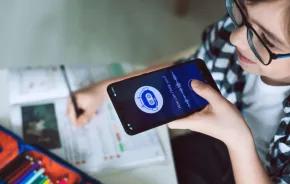
Research conducted over the years has indicated that playing video games can help children develop problem-solving skills, spark their imagination and creativity, and help them become more persistent. But screen time has also been associated with many negative effects. Some studies have found that excessive screen time can lead to attention and concentration problems, depression, anxiety, chronic health problems, sleep issues and obesity. Parents’ concerns about these negative impacts of screen time have been greatly intensified by the increased reliance on screens during the pandemic.
A recent international observational study delved into the risk factors of prolonged screen time and insufficient physical activity to the well-being of school-age children. The study, which was released in August, suggests that just two hours of screen time can lead to mental health impacts on girls, and twice that amount of time can have the same impact on boys. In another recently released study, researchers found that children born extremely prematurely who spend more than two hours a day in front of a screen are more likely to have cognitive and behavioral problems than other kids. This means that they are more likely to struggle with problem solving, focus and attention, and impulse control.
Parents often wonder about how screens affect their children’s development. While the research on the impact of screen time on child development remains inconclusive to date, several studies have come to similar conclusions. The following are five things you need to know about your child’s screen-time use, according to the science.
|
For more support and resources surrounding the youth mental health crisis, screen time and social media, and the importance of play, visit ParentMap’s Antidote for the Anxious Generation page. |
Reducing screen time reduces its negative effects on your child.
It is said that too much of anything is bad for you, and that is the one thing that all researchers agree on when it comes to screen time. What they disagree on is just how much is too much. Some of the research is quite alarming. For instance, some studies suggest that more than one hour of screen time a day can lead to depression and anxiety in teens.
What really matters is how screen use is affecting your child and your family life.
According to the American Academy of Pediatrics, children younger than 2 should be kept away from screens, and screen use should be limited to a maximum of two hours a day for those 2 and older. Not all parents agree with these recommendations, and that’s okay. What really matters is how screen use is affecting your child and your family life. The reality today is that children are spending much longer than one hour a day on screens.
The problem with screen-time overuse is that it leaves little time for other activities and, as some studies suggest, it can also lead to a weaker sense of well-being in children between the ages of 2 and 17, and to less curiosity and self-control.
There are a few things you can do to reduce your child’s screen time:
Create screen-free zones and moments: Determining areas in which screens are strictly forbidden can help reduce an overdependence on screens. For example, bedrooms can be screen-free zones.
You can also create screen-free moments. Just like screen-free zones, you can determine screen-free moments in your home (for example, no screens during mealtimes).
It is hard for your child to resist screens when notifications keep buzzing, so it is also a good idea to switch notifications off.
Set screen-use rules: It is important to set screen-use rules to make your expectations clear to both you and your child.
- When can they use screens — mornings, afternoons, after homework?
- Is screen-use time a right or a privilege?
- What are the consequences if screen-use rules are disrespected?
Establishing clear rules as early as possible limits the drama you are likely to have in the future when you attempt to make changes that will affect your child’s screen use.
As psychotherapist Victoria Matthews has noted, today’s children live a lifestyle we cannot understand, and it is therefore important to avoid invalidating their experiences. She says that rather than force your child to switch off, what really matters is helping them find balance.
Outdoor activity helps reduce the negative impacts of screens.
In the cited study that found that just two hours of screen use can harm adolescents’ mental health, the researchers noted that physical activity was the best solution to counteract screen-time overuse. They propose that children should spend at least one hour a day doing physical activities and a maximum of two hours a day on screens.
Monitor screen time.
It is impossible to know the exact amount of time your child spends on screens if you do not monitor their time on devices and what that time is being spent on (video games, streaming media, social media, etc.).
Some devices have in-built functions that allow you to monitor the exact amount of time your child spends on specific games, set time limits and even disable applications once the set time limit is reached.
Know what they’re playing.
Monitoring your child’s screen use also means ensuring that the subject of their focus during that time is age-appropriate.
The Entertainment Software Rating Board (ESRB) provides information about the content of games and apps, which enables parents and consumers to make informed choices about which games are right for their family. Common Sense Media’s detailed reviews are another excellent resource for evaluating the appropriateness of video and mobile games. Always consult the official ratings and be sure to consider your child’s developmental stage, maturity level and experience.
Choose active over passive screen time.
Not all screen-time use is equal. We now know that passive screen-time use is more harmful than active use. In other words, passively watching television has more negative effects on your child’s development than when they are actively engaged in media that require them to focus, stay attentive, or work with other players to reach a common goal.
In the study that concluded that screen time has a different impact on mental health depending on whether the player was a girl or a boy, researchers found that this could be explained by the fact that boys tended to be more active with their screen time. Girls were more likely to passively watch television or spend time on social media, while boys generally spent their screen time playing games.
We now know that strategic video games can help your child develop important skills, such as cooperation, creativity, hand-eye coordination and concentration. Making these types of games a privilege can help your child adopt a more active approach to screen use.
Even though the huge body of research on video-game use is yet to fully address the screen-use issue, one thing is clear: If your child is ignoring all other aspects of life and seems interested only in activities involving screens, then they require your intervention and help to establish a healthier balance.











